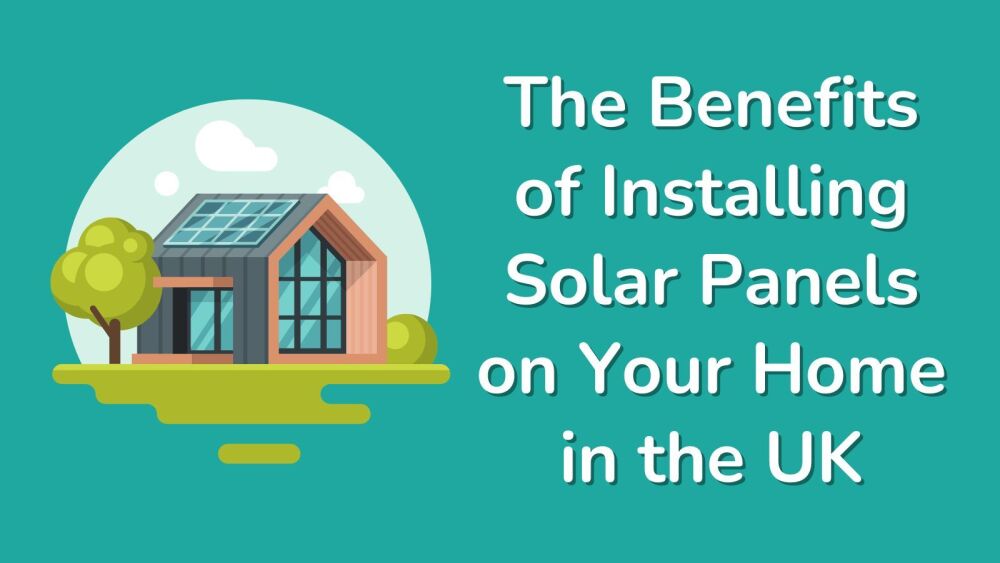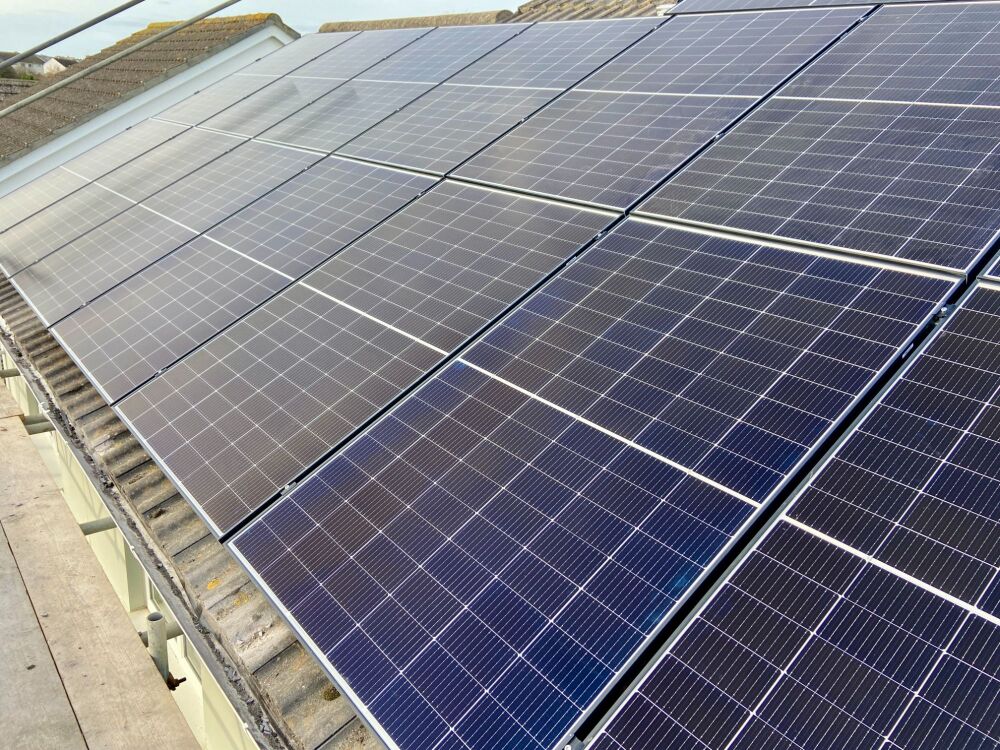The Benefits of Installing Solar Panels on Your Home in the UK
Posted on
Harnessing solar panels provides homeowners with many financial, environmental, and energy independence benefits. We explore the key advantages of solar energy, particularly the solar energy environmental impact, allowing UK homeowners to make a well-informed choice regarding their energy future.

A Guide to Solar Energy
Solar energy, the radiant light and warmth from the sun, can be captured using technologies such as photovoltaics, including solar photovoltaic panels (solar PV panels). These panels are instrumental in electricity generation, transforming sunlight into a clean, green renewable energy source for homes and businesses. With the availability of sunlight, solar energy emerges as a highly resourceful option, especially for remote areas lacking traditional electrical infrastructure.
How Do Solar Panels Work?
Solar PV panels absorb sunlight with photovoltaic cells to generate direct current (DC) energy, which is then transformed into usable alternating current (AC) energy through inverter technology. The AC energy is distributed via the home's electrical panel, enhancing energy efficiency as it powers electronic devices.

The Environmental Upside of Solar Panels
Installing solar panels on your UK property comes with many benefits when it comes to the environment such as reducing pollution and energy waste. Here’s how:
Clean Energy Production
A notable benefit of solar panels is their minimal solar panels environmental impact. By converting sunlight into electricity without burning fossil fuels, solar panels significantly lower the carbon dioxide emissions and environmental impacts of solar energy, making them a green choice for homes and businesses.
Reduction in Pollution
Solar power stands out as a renewable energy source, underscoring the sustainability of solar energy as it does not exhaust natural resources like fossil fuels. Unlike traditional electricity production methods that emit harmful gases by burning fossil fuels, solar panels contribute to a more renewable and sustainable future.
Energy Independence
The advantages of having solar panels installed include the opportunity for homes and businesses to gain more self-sufficiency in energy usage. This advantage of solar power reduces the dependence on fossil fuels and any toxic emissions linked to their extraction, transportation, and combustion.
Grid Decentralisation
With numerous solar installations connected to the grid, there is a decrease in the need for long-distance electricity transmission. This leads to reduced energy losses and enhances energy efficiency while lowering any pollution related to electricity transmission.
The Financial Benefits of Solar Panels
Harnessing solar panel benefits not only aids the environment but also yields significant financial savings for homeowners. Over time, solar panels should pay for themselves and opting for green energy has money-saving benefits for the homeowner.
Lower Energy Costs
The advantages of solar energy become apparent when your solar panel installer connects your panels to the inverter, initiating immediate savings on your electricity bills without any hidden costs.
Increased Property Value
One of the advantages is the potential increase in your property's value, as homebuyers are increasingly attracted to homes that have solar panels installed.
Government Incentives
The advantages of solar energy are further amplified by UK government incentives such as the Smart Export Guarantee (SEG), which compensates homeowners for selling surplus solar-generated electricity back to the grid, effectively making your solar panel system a potential source of income. Octopus energy offer a great rate for existing customers at the time of writing (click here to get an Octopus referral code and quote).
A Bright Future with Solar Energy
With the advantages of solar energy being the reduction in costs, a more self-sufficient lifestyle and the continuation of government incentives, an increasing number of homeowners are transitioning to solar energy.
Understanding why solar panels are a good form of energy capture becomes evident when considering the environmental benefits of solar energy, which include cutting down on pollution and fostering energy independence, offering compelling reasons for homeowners to go solar.
Why solar panels are good is clear when you consider the sustainability, energy cost reduction, and property value improvement they offer. Don't delay in contributing to a brighter, greener future by installing solar panels on your home!
The environmental benefits are undeniable when you install solar panels on your home in the UK. By switching to solar, you start contributing to a better tomorrow and directly experience how solar panels help the environment.
Frequently Asked Questions about Solar Panels
-
What is the environmental impact of making solar panels?
The production of solar panels has both positive and negative impacts on the environment.
Positive Impacts
• Renewable Energy Source: Once installed, solar panels generate electricity using a renewable energy source.
• Reduction of Fossil Fuel Dependence: Solar energy reduces reliance on potentially limited and polluting fossil fuels.
• Sustainable Growth: Solar energy can be a key component in sustainable energy strategies, which aim to meet present needs without compromising future generations.
Negative Impacts
• Resource Extraction: The manufacturing process starts with extracting raw materials, such as quartz sand for silicon cells, which can have environmental impacts.
• Energy Consumption: The purification of silicon and the manufacturing of solar panels require significant amounts of energy, which may come from non-renewable sources.
• Chemical Use: Hazardous chemicals in some solar panel manufacturing processes must be carefully managed to prevent environmental contamination.
• Water Usage: Solar panel production can be water-intensive, which may impact local water resources, especially in water-scarce regions.
• Waste Generation: The end-of-life disposal of solar panels is a growing concern, as they contain materials that may be toxic or difficult to recycle.
Mitigation Measures
• Recycling Programs: Developing comprehensive recycling programs for solar panels can help mitigate waste-related issues.
• Clean Energy Use: Using renewable energy to produce solar panels can reduce the overall carbon footprint of the solar industry.
• Sustainable Practices: Adoption of sustainable mining and manufacturing practices can minimise the environmental impact of raw material extraction and panel production.
• Water Management: Implementing water-efficient manufacturing processes can reduce water usage.
• Innovation: Continuous improvements in solar panel technologies may lead to more efficient, less resource-intensive production methods.
In summary: While solar panel production has some environmental impacts, they are generally considered significantly lower than conventional energy sources' impacts. Ongoing research and sustainable practices are focused on further reducing the ecological footprint of solar energy.
-
Do solar panels reduce carbon footprint and pollution?
Yes, solar panels can reduce carbon footprint. Solar panels convert sunlight directly into electricity; they are a clean, renewable source of energy that can significantly reduce the carbon footprint of an individual or entity that uses them.
Here's how:
• Reduction of Fossil Fuel Dependence: Solar panels generate electricity without burning fossil fuels. By reducing reliance on coal, oil, and natural gas, solar power decreases the emission greenhouse gases that may contribute to climate change.
• Long-Term Emission Reduction: Solar panels produce electricity without emitting greenhouse gases once they have been installed. Over their lifespan, which can exceed 25 years, they are less harmful to the environment in emissions when compared to conventional energy sources.
• Energy Production Efficiency: While there is pollution associated with manufacturing, transporting, and installing solar panels, the energy they produce is often far cleaner over time. The carbon payback period—how long it takes for a solar installation to offset the emissions created during its production—is typically a few years.
• Renewable Energy Source: Solar energy is virtually inexhaustible at a human scale, unlike fossil fuels, which may be finite. Hence, solar panels can contribute to a sustainable energy future.
• Support for a Green Economy: The increased adoption of solar energy can lead to further investments in clean energy technologies, improving efficiency, reducing costs, and fostering a green economy with lower overall pollution.

